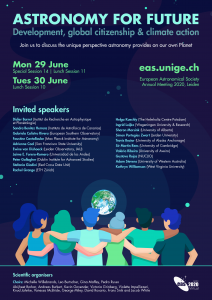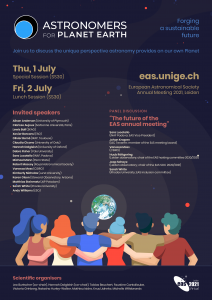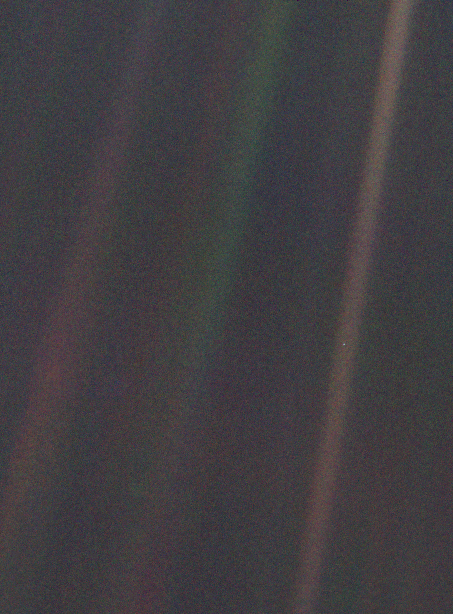Astronomers for Planet Earth are a fast growing group of astronomers worldwide who would like to convey the astronomical view of our planet — we are but a “pale blue dot” — to call for action & solve the climate crisis!
Astronomy is not just the study of other celestial objects like planets, stars and galaxies. It also serves to reflect upon our own world. Images such as the iconic Earthrise and the Pale Blue Dot are awe-inspiring symbols for the uniqueness and fragility of Earth, “the only home we’ve ever known”, as Carl Sagan wrote in his book (1997) with the same title. It is still true today despite more than 4000 known extrasolar worlds. There is no other world for us. In my view, this simple and powerful revelation is the single most important contribution that astronomy can bring to society. I am convinced that fully embracing this view will lead to a better world: We must protect Earth and preserve it for future generations. We must treat the human-made climate crisis as the serious threat that it is and immediately and significantly reduce the emissions of greenhouse gases.
In recent times I have therefore initiated and contributed to a number of activities around the globe to promote this idea and help fight against the climate crisis using the astronomical perspective.

 At the all-virtual EAS 2020 and EAS 2021 meetings, my colleagues and I organised a series of lunch/special sessions that were all related to using astronomy for development, education or climate action.
At the all-virtual EAS 2020 and EAS 2021 meetings, my colleagues and I organised a series of lunch/special sessions that were all related to using astronomy for development, education or climate action.
Together with a large number of colleagues world-wide (currently mostly in Europe and in the U.S., though) we have formed Astronomers for Planet Earth.
In various events, I am speaking about the climate crisis from the astronomical perspective. Please see the list of my public talks.
For a concise summary of this topic, please see this 20 minute talk I gave in August 2020 for the all-virtual DotDotAstro event.
For a slightly longer version, including a good discussion, please see this seminar talk that I gave in June 2020 at the Liverpool John Moore’s university:
Resources (sorted approximately by publication date)
- Second Nature Astronomy “Climate issue”, September 2021:
- Editorial: “Climate change continues to be an issue“
- Leonard Burtscher et al.: “Forging a sustainable future for astronomy“
- Alison Anderson & Gina Maffey: “Five steps for astronomers to communicate climate change effectively“
- Andrew Williams: “The need for political advocacy in astronomy“
- My article “Astronomy and the Climate Crisis” in the Leiden Observatory Annual Report 2019: My article only (PDF, 435 KB), entire annual report (PDF, 7.1 MB)
- Nature Astronomy “Climate Issue”, September 2020:
- Editorial (Journal link (open access))
- Knud Jahnke et al.: “An astronomical institute’s perspective on meeting the challenges of the climate crisis” (Journal link (open access)
- Nicolas Flagey et al.: “Measuring carbon emissions at the Canada–France–Hawaii Telescope” (Journal link (paywalled), Free access via Nature’s official SharedIt service)
- Simon Portegies Zwart: “The ecological impact of high-performance computing in astrophysics” (Journal link (paywalled), Free access via Nature’s official SharedIt service)
- Leonard Burtscher et al.: “The carbon footprint of large astronomy meetings” (Journal link (open access))
- Faustine Cantalloube et al.: “The impact of climate change on astronomical observations” (Journal link (paywalled), Free access via Nature’s official SharedIt service)
- Adam Stevens et al.: “The imperative to reduce carbon emissions in astronomy” (Journal link (open access))
- White papers on astronomy and the climate crisis:
- for the U.S. American Astro2020 Decadal Survey: Kathryn Williamson, Travis A. Rector, James Lowenthal: Embedding Climate Change Engagement in Astronomy Education and Research
- for the Canadian Long Range Plan 2020: Christopher D. Matzner et al.: Astronomy in a Low-Carbon Future
- the Australian view (a Nature Astronomy article): Adam Stevens et al.: The imperative to reduce carbon emissions in astronomy
- see also the much earlier white paper for the 2020 Decadal Survey in the U.S. by P.J. Marshall et al.: Low-Energy Astrophysics: Stimulating the Reduction of Energy Consumption in the Next Decade
- Estimations of carbon emissions related to astronomical activity:
- Didier Barret: Estimating, monitoring and minimizing the travel footprint associated with the development of the Athena X-ray Integral Field Unit — An on-line travel footprint calculator released to the science community and the travel footprint calculator (also for large meetings) that is described in the paper.
- General articles about the climate crisis
- A good, very short article on the topic by some very senior politicians and climate scientists: “Three years to safeguard our climate“
- On the reduction of carbon emissions due to the Covid-19 crisis

